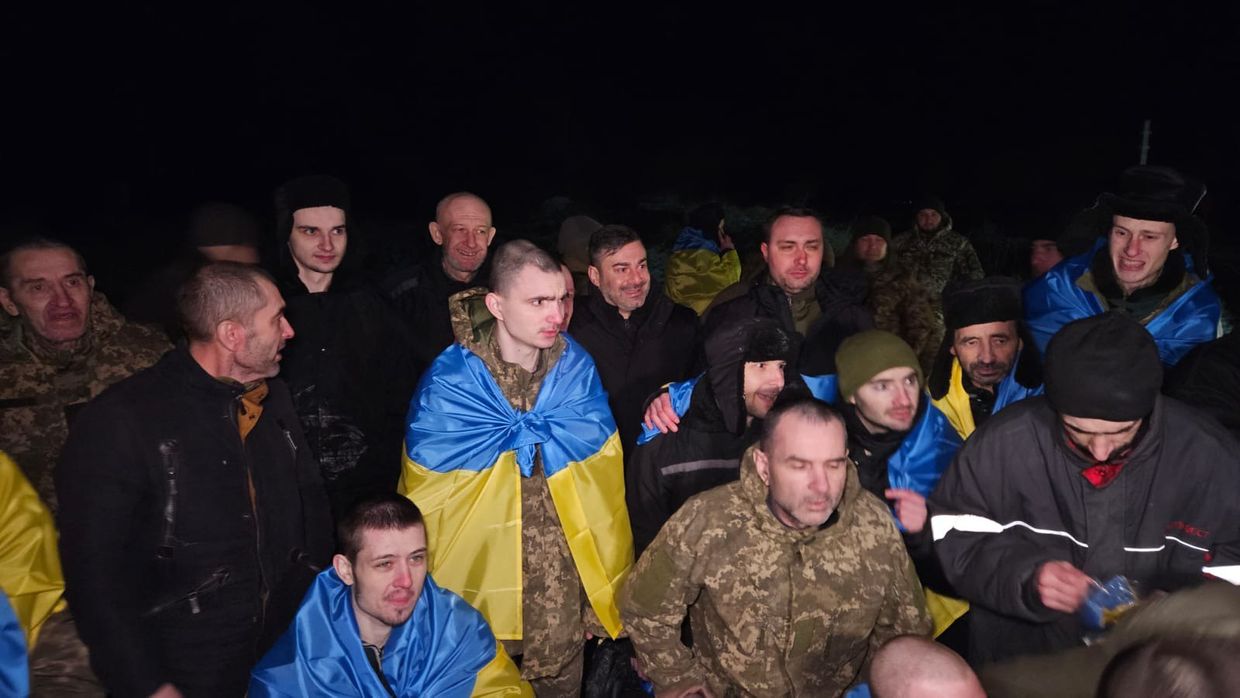Daily Flyer - January 3, 2024
A voice of Ukraine to the West

230 Ukrainian POWs return home from Russian captivity in largest prisoner exchange in full-scale war

In a major development amid the ongoing Russo-Ukrainian conflict, over 200 Ukrainian prisoners of war (POWs) were repatriated from Russian captivity on January 3, marking the largest such exchange since the commencement of Russia's full-scale invasion. The Coordination Headquarters for the Treatment of the Prisoners of War reported the successful repatriation, signaling a potential shift in dynamics following a period of halted exchanges.
The recent exchange contrasts starkly with the previous swap in August of the preceding year, after which Moscow allegedly refused to continue the practice. Ukrainian officials suggested that this refusal was part of an attempt to exploit the families of POWs, turning them against their own authorities. The return of 230 prisoners on January 3 included personnel from various branches of Ukraine’s Armed Forces, Territorial Defense Forces, National Guard, border guards, and a police officer. Additionally, six civilians, comprising both those with official POW status and those previously considered missing, were part of the repatriation.
The spectrum of freed POWs encompasses a range of backgrounds, including privates, sergeants, and notable individuals such as a combat medic from Ukraine's 36th Marine Brigade, who defiantly spoke Ukrainian while in captivity. The release also saw the return of five women, including a musician from a military band, a national guardswoman captured while on maternity leave, and defenders of Zmiinyi (Snake) Island. The inclusion of diverse individuals highlights the broad impact of the conflict on Ukrainian society.
Acknowledging the significance of international cooperation, the Coordination Headquarters expressed gratitude to the United Arab Emirates for its active role in facilitating the exchange. This collaborative effort underscores the importance of global solidarity in addressing the humanitarian aspects of the conflict.
Ukrainian authorities have consistently accused Russia of mistreating Ukrainian POWs and violating international humanitarian law throughout the conflict. Reports suggest that Russia, at one point, held at least 3,500 Ukrainian POWs, with the number suspected to be higher. The freezing of prisoner swaps, as observed in 2023, raised concerns about Russia's potential attempts to destabilize Ukrainian society.
President Volodymyr Zelensky, in his video address, emphasized the persistent efforts to negotiate the return of captives despite the pause in exchanges. Expressing gratitude to those involved in the repatriation, Zelensky stressed the importance of every captured Russian soldier, as their captivity strengthens Ukraine's position in negotiations.
Amidst reports of the mistreatment of Ukrainian POWs by Russian forces, including the use of prisoners as human shields, the international community has intensified scrutiny. Videos depicting tortures and brutal executions of Ukrainian POWs by Russian soldiers have prompted investigations by Ukrainian law enforcement agencies.
The substantial exchange of Ukrainian prisoners of war represents a notable development in the Russo-Ukrainian conflict, potentially signaling renewed diplomatic engagement. As the international community closely monitors these exchanges, there is a growing imperative to address humanitarian concerns, ensure compliance with international law, and work toward a peaceful resolution to the enduring crisis in the region.
Polish farmers to resume blockade of Ukrainian border after temporary reprieve
In a continuing saga of tensions, Polish farmers are set to recommence their blockade on January 4 at the Shehyni-Medyka crossing on the Polish-Ukrainian border. The Polish Press Agency reported on January 3 that Roman Kondrow, the leader of the protesting Polish farmers organization, "Betrayed Countryside," announced the resumption of the blockade, which had been temporarily suspended on December 24.
The farmers initially joined the protest in November, aligning with Polish truckers who were blocking four crossings with Ukraine. The protest primarily centers around opposition to the European Union's liberalization of transit rules for Ukrainian truckers. Now, with the resumption of their blockade, the farmers are demanding written assurances regarding subsidies for growing corn, increased loans, and the maintenance of the agricultural tax at its current rate.
Roman Kondrow emphasized that despite a visit by Polish Agriculture Minister Czeslaw Siekierski to the border blockade in late December, the farmers await a response from Prime Minister Donald Tusk, who, as per Kondrow, "rules the whole country." The lack of explicit guarantees has fueled the decision to restart the protest, which is anticipated to be more stringent than before.
While military equipment, humanitarian aid, dangerous goods, and perishable items will still be permitted to cross the border, other trucks will face restrictions, allowing only one truck to pass per hour. This move aims to intensify pressure on the Polish government to address the farmers' concerns and find a resolution to the ongoing dispute.
The underlying issue revolves around a ban on importing Ukrainian grain, which escalated into a diplomatic dispute in September 2023. Prime Minister Tusk has pledged to end the blockade, but divisions within his governing coalition suggest a possible continuation of the grain import ban. The resumption of the border blockade underscores the complexity of the situation and the challenges in finding a mutually acceptable resolution to the ongoing transit rules dispute between Poland and Ukraine.
Russian attacks shift focus from energy to defense industry
Recent intelligence reports from the U.K. Defense Ministry highlight a notable shift in Russian military strategy during the intensified attacks on Ukraine. The latest strikes, characterized by massive waves of drones and missiles on December 29 and January 2, indicate a shift in focus from energy infrastructure, as observed in the previous year, to defense industry targets. This strategic change suggests that Moscow recognizes the importance of undermining Ukraine's relative defense industrial capacity in the face of a potentially protracted conflict.
Unlike the attacks in the previous year that primarily prioritized energy infrastructure, recent strikes by Russian forces have been directed at defense industry targets. The U.K. Defense Ministry views this shift as a potentially temporary change in strategy, driven by the acknowledgment of defense production's critical role in sustaining a prolonged conflict.
In response to the evolving threat landscape, Ukrainian officials have announced plans to ramp up domestic defense production in 2024. Deputy Defense Minister Ivan Havryliuk disclosed last November that the manufacturing of missiles and other arms is expected to increase significantly this year. President Volodymyr Zelensky emphasized the importance of drone technology on Ukrainian battlefields, revealing plans to produce 1 million drones in 2024.
Kyiv's commitment to prioritizing domestic arms production was echoed by Defense Minister Rustem Umerov, who invited foreign partners to collaborate in manufacturing arms within Ukraine. This proactive approach aligns with the nation's determination to strengthen its defense capabilities amid evolving threats.
While the recent focus of Russian strikes has shifted towards defense industry targets, Ukraine's energy infrastructure has not been spared. The U.K. Defense Ministry previously estimated that attacks on December 7 marked the beginning of a concentrated campaign targeting energy infrastructure. However, subsequent attacks did not match the scale witnessed in the past few days.
Following the strikes on January 2, Ukraine's Air Force reported that Moscow targeted both industrial and military facilities, along with critical infrastructure. Power lines in Kyiv Oblast were damaged, resulting in outages that temporarily left 260,000 residents without electricity. This serves as a reminder that, despite the change in tactics, Russia has not entirely abandoned its efforts to impact Ukraine's energy grid.
The shift in Russian military tactics, focusing on defense industry targets rather than energy infrastructure, underscores the fluid nature of the conflict. As Ukraine responds with a commitment to bolstering its domestic defense production, the region remains on high alert. The evolving situation emphasizes the importance of adaptability in response to dynamic threats and the need for international vigilance in assessing and addressing the evolving Russo-Ukrainian conflict.

